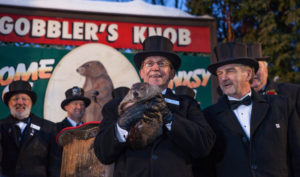
Can you see Nigel’s shadow?
The thing that is most surprising about the Groundhog Day elements of UKIP is that it is at all surprising: it’s not as if we’ve not been here before, talking about the same people and the same issues.
The current bout of metaphorical – and not yet literal – fisticuffs has been driven by the continued enmity of Nigel Farage and Douglas Carswell. The former has never cared at all for the latter, except for the huge boost his defection in 2014 gave the campaign for the 2015 general election. Likewise, Carswell was never a good fit with the party, a view underlined by the revelation of the ‘Tate plot‘, Daniel Hannan’s masterplan to detoxify UKIP ahead of the EU referendum.
Politically, Carswell is a libertarian misfit in the party’s ragtag populist jumble. Personally, one doubts that any kind words have been exchanged between him and Farage.
In addition, the proximate cause of the barney – Farage not getting a peerage or a knighthood – is another very long-running saga. It’s well over a decade now that assorted tales of the burning desire of Farage to be accepted into the upper House have come to me in various forms. Sometimes it was framed as his price for standing down the party, sometimes as reward for his service to the nation; but the one constant was that ‘Nigel wants to be ennobled’. And I’ll work on the basis that if I was hearing this then it has been an open secret in all relevant circles.
So why the fuss?
Partly, this is about the poor showing in last week’s by-elections, especially Stoke Central. Paul Nuttall, the new leader (partly by default), needed to make a good fist of these votes, primarily to demonstrate his (and his party’s) continued relevance, but also to vindicate his change of emphasis to usurping Labour in their Northern heartlands. The failure to produce a Richmond-style upset (which has given the Lib Dems a burst of new life) inevitably put backs up in a party that is still working through its Farage-departure-grief issues.
That Farage himself has taken lessons in back-seat driving from his hero, Margaret Thatcher, doesn’t help, especially with his backer Arron Banks very unburdened in making the kind of bold statements that journalists love to quote.
If this comes across as blah, blah, then it’s because this has been very much the default mode of the party. Internal bickering, personality clashes and fights, an unstable and contingent record of success: this is as true now as it was in 1993 (when it was founded) or 2004 (year of the great Kilroy-Silk farce). Plus ça change, etc.
As such, the usual flurry of “is this the end of UKIP?” pieces misses the point: the party has form in this and all the available evidence suggests that it will find a solution (even if it is one that creates its own problems).
The easiest way to understand this is the mismatch of supply and demand for UKIP.
On the supply side, we have a mess. There’s a party, but one with personnel, organisational, financial and reputational issues. UKIP is no closer to a core ideology than it was at its formation, instead throwing together policies on an ad hoc basis (with the notable exception of the 2015 general election manifesto (see end of text)): the marked strengthening of marketing and strategy in the past 5 years only partly covers this.
But the party survives, because there is demand for it. The rhetorical approach of Farage – and Nuttall, to a lesser extent – is built on the sense of disconnect and dissatisfaction that many voters feel: we don’t need smarty-pants politicians, we just need to use a bit of common sense. Seen differently, one should focus not on the failure to win any more than one seat in the general election, but on the 4 million votes the party got. That’s a lot of people willing to put their money where their mouth is and isn’t going to disappear anytime soon.
Two thoughts arise from this.
The first is that even if UKIP does suffer further ructions, it is likely to survive. Even the mooted Farage/Banks populist movement would find itself struggling to differentiate itself in the longer term from a UKIP that has grown beyond its narrow anti-EU origins.
The second is that Brexit is not the be-all and end-all of British politics. It changes a lot of things, but it doesn’t change everything. Among the many dangers that the coming years contain, the high probability that other social forces will be allowed either to drift or to be captured by special interests is one that must give much cause for concern. With a political class and a media that necessarily must give most of its efforts to managing and observing a huge change in public policy, there is a lot of opportunity for others to advance their agendas. As Boris Johnson would doubtless put it, Brexit is like D-Day: crucially important, but not the whole war.
AMENDED 1000: As Suzanne Evans rightly points out, the 2015 manifesto was developed and costed (unlike other parties’), so I’ve changed the text above. However, I’d note that even this document does not contain a core, underlying ideological position, but rather a series of uneasy interactions between liberalism, conservativism, populism and more.
